高一英语模块一unit1 school life language points[下学期]
文档属性
| 名称 | 高一英语模块一unit1 school life language points[下学期] |

|
|
| 格式 | rar | ||
| 文件大小 | 523.7KB | ||
| 资源类型 | 教案 | ||
| 版本资源 | 牛津译林版 | ||
| 科目 | 英语 | ||
| 更新时间 | 2006-08-20 00:00:00 | ||
图片预览

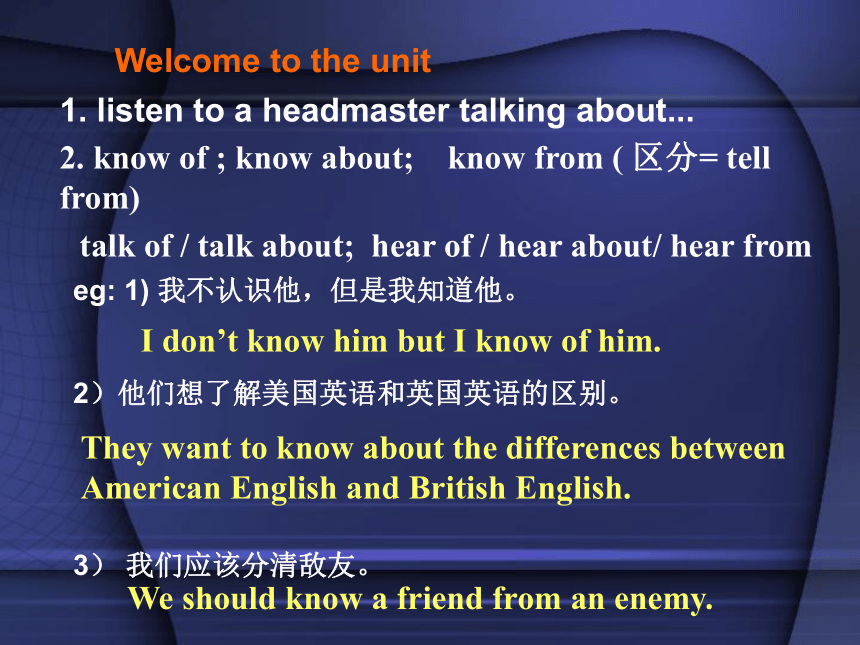
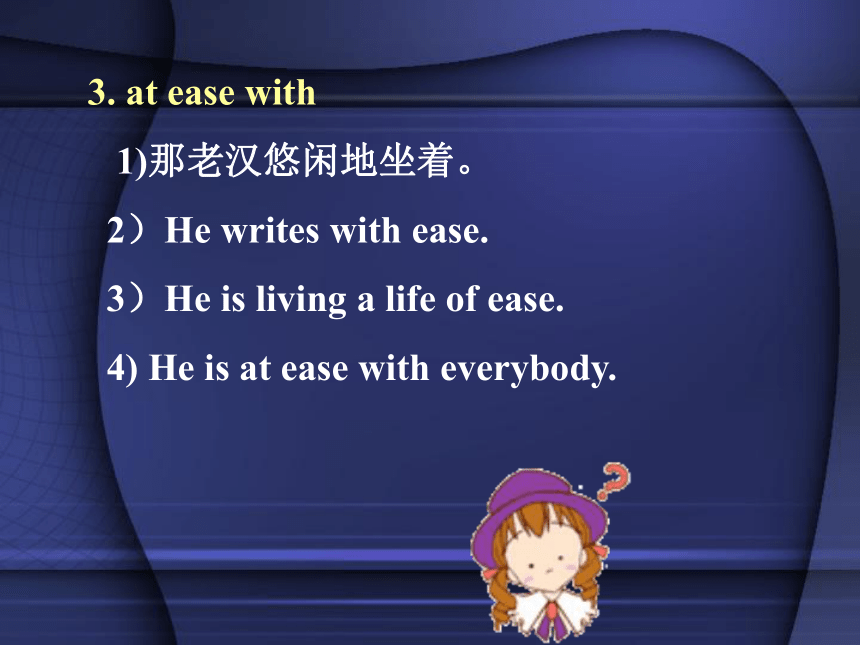
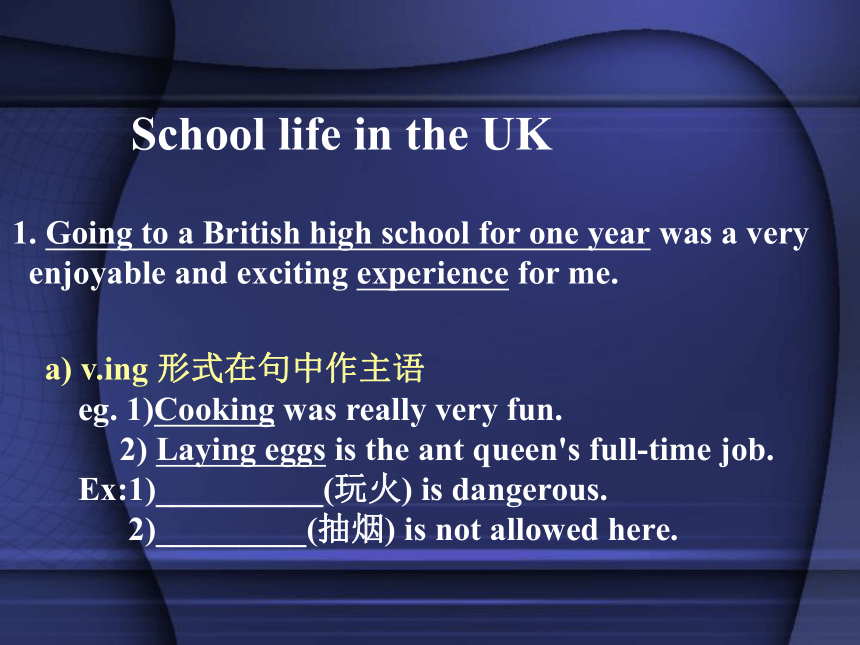
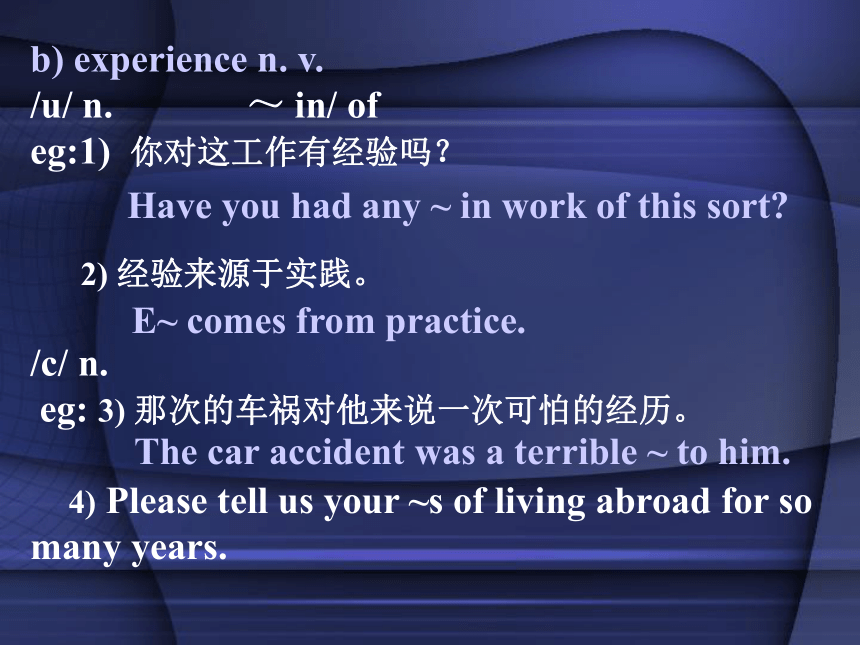
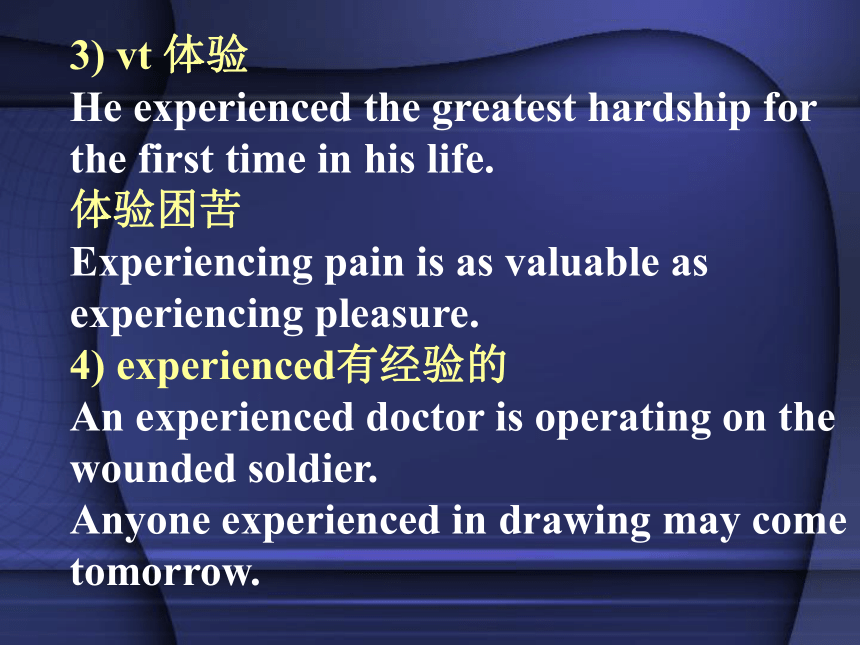
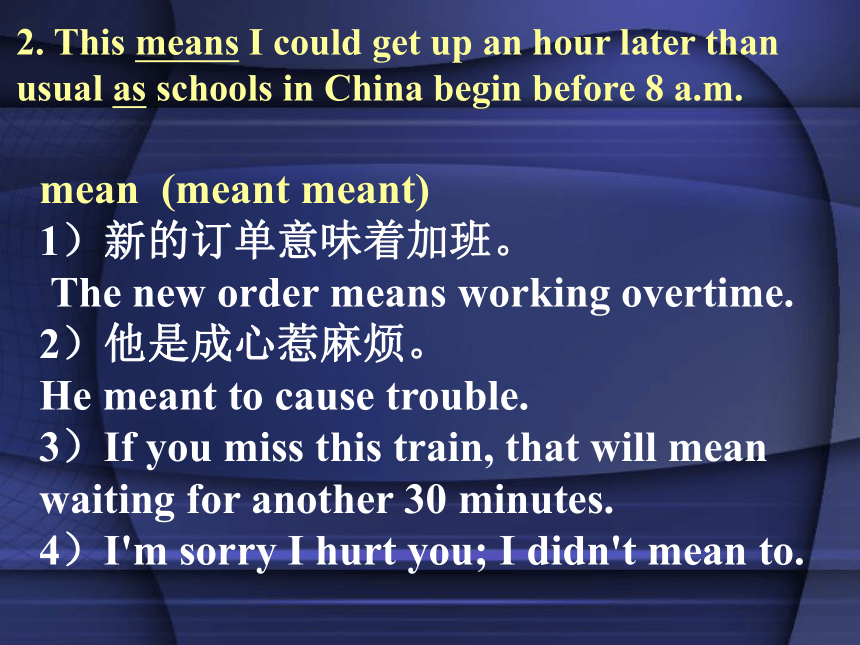

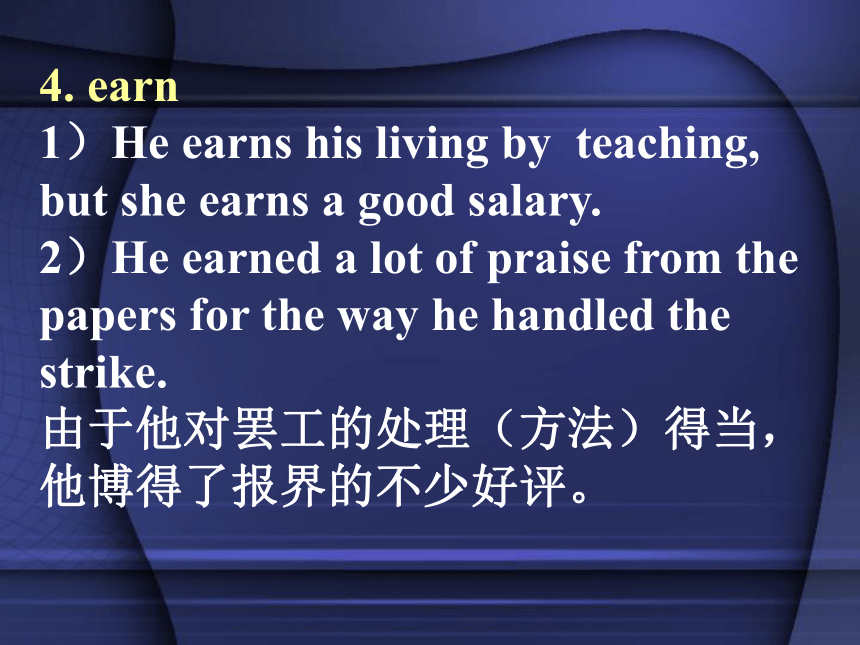
文档简介
课件24张PPT。Unit 1 School life
laguage poimtsWelcome to the unit1. listen to a headmaster talking about...2. know of ; know about; know from ( 区分= tell from) eg: 1) 我不认识他,但是我知道他。
2)他们想了解美国英语和英国英语的区别。
3) 我们应该分清敌友。
I don’t know him but I know of him.They want to know about the differences between American English and British English.We should know a friend from an enemy.talk of / talk about; hear of / hear about/ hear from3. at ease with
1)那老汉悠闲地坐着。
2)He writes with ease.
3)He is living a life of ease.
4) He is at ease with everybody.School life in the UK 1. Going to a British high school for one year was a very
enjoyable and exciting experience for me.a) v.ing 形式在句中作主语
eg. 1)Cooking was really very fun.
2) Laying eggs is the ant queen's full-time job.
Ex:1)__________(玩火) is dangerous.
2)_________(抽烟) is not allowed here.b) experience n. v.
/u/ n. ~ in/ of
eg:1) 你对这工作有经验吗?
2) 经验来源于实践。
/c/ n.
eg: 3) 那次的车祸对他来说一次可怕的经历。
4) Please tell us your ~s of living abroad for so many years.Have you had any ~ in work of this sort?E~ comes from practice.The car accident was a terrible ~ to him.3) vt 体验
He experienced the greatest hardship for the first time in his life.
体验困苦
Experiencing pain is as valuable as experiencing pleasure.
4) experienced有经验的
An experienced doctor is operating on the wounded soldier.
Anyone experienced in drawing may come tomorrow.2. This means I could get up an hour later than usual as schools in China begin before 8 a.m.mean (meant meant)
1)新的订单意味着加班。
The new order means working overtime.
2)他是成心惹麻烦。
He meant to cause trouble.
3)If you miss this train, that will mean waiting for another 30 minutes.
4)I'm sorry I hurt you; I didn't mean to.3 attend
1) go to
Did you attend the meeting yesterday?
She was sick so she didn't attend her classes.
有两位护士看护着她。
She has two nurses attending (on/upon) her.
attend a lecture / a party / a meeting
attend school
attend church
May I join in your conversation?
join the army4. earn
1)He earns his living by teaching, but she earns a good salary.
2)He earned a lot of praise from the papers for the way he handled the strike.
由于他对罢工的处理(方法)得当,他博得了报界的不少好评。5 respect
1) 尊敬
Show some respect for your parents.
Have some respect for your parents.
他毫不在意别人的感受。
He has no respect for the feelings of others.
2)vt.
He's much respected by all his colleagues.
我们尊他为伟大的领袖。
We respect him as a great leader.
I deeply respect your courage.
6 achieve vt. achievement n.
1) to finish successfully 完成,做到
如果他不加紧努力,他会一事无成。
2) gain 达到,实现
他达到了他的目的。
He achieved his goal.
achieve successHe will never achieve anything
if he doesn't work hard.7. average
1) n / on average
The average of 3, 8 and 10 is 7.
His school work is well above / below average.
We receive 20 letters a day on average.
2) adj.
What is the average rainfall for July?
There is nothing special about the film. It was only average.(一般)
3)v
Our mail averages 20 letters a day.
I average eight hours' work a day.8. used to
be used to do sth
be used to doing
I used to go to school by bike and now I am used to walking to school.
9. sound ( like ) + n.
sound + adj.
eg: 1) 那听起来是个好主意。
2) The plan sounds _____ ( good / well).
3) Her voice sounds _______( beautiful/ beautifully).
10. a bit = a little
not a bit = not at all
not a little = much
eg: 1) He is not a bit surprised at the news.
2) He is not a little surprised at the news.
Ex: 1) I am ____ tired, so I can’t go any further.
2) He is _____ sad, as if it had nothing to do with him.
11. challenging adj.
challenge vt.邀请,向……挑战
1) I challenge him to a game of tennis.
2) I challenge you to race me across the lake.
3) She finds her new job very challenging.12. ..., so it was difficult to remember all the faces and names. It is + adj./ n. ( for sb / of sb ) +to do stheg. 1)在两天之内完成这份工作是不容易的。
2)你及时到达那里是很重要的。
3)熬夜(stay up)是个坏习惯。
4) It was clever ________ at the decision in two
minutes.
A. for him to arrive B. for his arriving
C. of him to arrive D. of his arriving It is not easy to finish the work in two days.It is very important for you to get there in time.It is a bad habit to stay up late13. fun /u/n.
for fun; make fun of; have great funTom 很有趣。
2) _______(What/ How) great fun the
children had at the seaside !
3) He said it only _____ fun.
4) It’s wrong to __________ the disabled
.Tom is good fun. 14. drop v.
1)to fall or let fall
She dropped her glasses and broke them.
The apple dropped (down) from the tree.
The temperature has dropped.
2) give up
I'm going to drop history this year.
When the fire alarm rang I dropped everything and ran out of the building.
14. relax
1) Sit down and relax.
2) The music will help to relax you.
relaxation
relaxed; relaxing
3) He was lying in the sun looking very _______ and happy.
4) The music is ________.
5) We are having _______ weather.
I will never forget the time I spent in British. 1. __________
At the first day, we all went to attend assembly. 2. __________
the head master told us the best way to earn 3. __________
respect was work hard. The homework was less than 4. ________
what I was used to get in my old school. Every 5. __________
day I spent an hour read English books. 6. __________
I often go to our school computer club to send 7. __________
e-mails to my friends free. Students there have 8. __________
to study some subjects, and can drop some 9. __________
Though the life there was not easy, but I 10. _________
enjoyed it.BritainOn√to^^readingwentforbut5.She felt lucky because ________________.
A. she could get up an hour later than usual
B. the headmaster told them to earn respect by working hard and achieving high grades
C. she had been given a golden opportunity to study in Britain and met helpful and friendly teachers and students
D. she improved her English Nowadays, more and more young students are going abroad to study. What effects(影响) will the new school life have on them?Discussion:Advantages:
1. Widen their view
2. Improve their English
3. Learn to be independent and cooperate with others
4. Learn about foreign customs and culture
5. Let the foreigners learn about china and attract them to invest in China
6. Learn advanced technology Disadvantages:
1. cost a lot of money and cause a heavy burden to their parents
2. feel homesick
3. form bad habits
4. stay in a foreign country and refuse to come back Homework:
1. Recite the first three paragraphs
2. Read the text carefully again and try to find out the language points.
laguage poimtsWelcome to the unit1. listen to a headmaster talking about...2. know of ; know about; know from ( 区分= tell from) eg: 1) 我不认识他,但是我知道他。
2)他们想了解美国英语和英国英语的区别。
3) 我们应该分清敌友。
I don’t know him but I know of him.They want to know about the differences between American English and British English.We should know a friend from an enemy.talk of / talk about; hear of / hear about/ hear from3. at ease with
1)那老汉悠闲地坐着。
2)He writes with ease.
3)He is living a life of ease.
4) He is at ease with everybody.School life in the UK 1. Going to a British high school for one year was a very
enjoyable and exciting experience for me.a) v.ing 形式在句中作主语
eg. 1)Cooking was really very fun.
2) Laying eggs is the ant queen's full-time job.
Ex:1)__________(玩火) is dangerous.
2)_________(抽烟) is not allowed here.b) experience n. v.
/u/ n. ~ in/ of
eg:1) 你对这工作有经验吗?
2) 经验来源于实践。
/c/ n.
eg: 3) 那次的车祸对他来说一次可怕的经历。
4) Please tell us your ~s of living abroad for so many years.Have you had any ~ in work of this sort?E~ comes from practice.The car accident was a terrible ~ to him.3) vt 体验
He experienced the greatest hardship for the first time in his life.
体验困苦
Experiencing pain is as valuable as experiencing pleasure.
4) experienced有经验的
An experienced doctor is operating on the wounded soldier.
Anyone experienced in drawing may come tomorrow.2. This means I could get up an hour later than usual as schools in China begin before 8 a.m.mean (meant meant)
1)新的订单意味着加班。
The new order means working overtime.
2)他是成心惹麻烦。
He meant to cause trouble.
3)If you miss this train, that will mean waiting for another 30 minutes.
4)I'm sorry I hurt you; I didn't mean to.3 attend
1) go to
Did you attend the meeting yesterday?
She was sick so she didn't attend her classes.
有两位护士看护着她。
She has two nurses attending (on/upon) her.
attend a lecture / a party / a meeting
attend school
attend church
May I join in your conversation?
join the army4. earn
1)He earns his living by teaching, but she earns a good salary.
2)He earned a lot of praise from the papers for the way he handled the strike.
由于他对罢工的处理(方法)得当,他博得了报界的不少好评。5 respect
1) 尊敬
Show some respect for your parents.
Have some respect for your parents.
他毫不在意别人的感受。
He has no respect for the feelings of others.
2)vt.
He's much respected by all his colleagues.
我们尊他为伟大的领袖。
We respect him as a great leader.
I deeply respect your courage.
6 achieve vt. achievement n.
1) to finish successfully 完成,做到
如果他不加紧努力,他会一事无成。
2) gain 达到,实现
他达到了他的目的。
He achieved his goal.
achieve successHe will never achieve anything
if he doesn't work hard.7. average
1) n / on average
The average of 3, 8 and 10 is 7.
His school work is well above / below average.
We receive 20 letters a day on average.
2) adj.
What is the average rainfall for July?
There is nothing special about the film. It was only average.(一般)
3)v
Our mail averages 20 letters a day.
I average eight hours' work a day.8. used to
be used to do sth
be used to doing
I used to go to school by bike and now I am used to walking to school.
9. sound ( like ) + n.
sound + adj.
eg: 1) 那听起来是个好主意。
2) The plan sounds _____ ( good / well).
3) Her voice sounds _______( beautiful/ beautifully).
10. a bit = a little
not a bit = not at all
not a little = much
eg: 1) He is not a bit surprised at the news.
2) He is not a little surprised at the news.
Ex: 1) I am ____ tired, so I can’t go any further.
2) He is _____ sad, as if it had nothing to do with him.
11. challenging adj.
challenge vt.邀请,向……挑战
1) I challenge him to a game of tennis.
2) I challenge you to race me across the lake.
3) She finds her new job very challenging.12. ..., so it was difficult to remember all the faces and names. It is + adj./ n. ( for sb / of sb ) +to do stheg. 1)在两天之内完成这份工作是不容易的。
2)你及时到达那里是很重要的。
3)熬夜(stay up)是个坏习惯。
4) It was clever ________ at the decision in two
minutes.
A. for him to arrive B. for his arriving
C. of him to arrive D. of his arriving It is not easy to finish the work in two days.It is very important for you to get there in time.It is a bad habit to stay up late13. fun /u/n.
for fun; make fun of; have great funTom 很有趣。
2) _______(What/ How) great fun the
children had at the seaside !
3) He said it only _____ fun.
4) It’s wrong to __________ the disabled
.Tom is good fun. 14. drop v.
1)to fall or let fall
She dropped her glasses and broke them.
The apple dropped (down) from the tree.
The temperature has dropped.
2) give up
I'm going to drop history this year.
When the fire alarm rang I dropped everything and ran out of the building.
14. relax
1) Sit down and relax.
2) The music will help to relax you.
relaxation
relaxed; relaxing
3) He was lying in the sun looking very _______ and happy.
4) The music is ________.
5) We are having _______ weather.
I will never forget the time I spent in British. 1. __________
At the first day, we all went to attend assembly. 2. __________
the head master told us the best way to earn 3. __________
respect was work hard. The homework was less than 4. ________
what I was used to get in my old school. Every 5. __________
day I spent an hour read English books. 6. __________
I often go to our school computer club to send 7. __________
e-mails to my friends free. Students there have 8. __________
to study some subjects, and can drop some 9. __________
Though the life there was not easy, but I 10. _________
enjoyed it.BritainOn√to^^readingwentforbut5.She felt lucky because ________________.
A. she could get up an hour later than usual
B. the headmaster told them to earn respect by working hard and achieving high grades
C. she had been given a golden opportunity to study in Britain and met helpful and friendly teachers and students
D. she improved her English Nowadays, more and more young students are going abroad to study. What effects(影响) will the new school life have on them?Discussion:Advantages:
1. Widen their view
2. Improve their English
3. Learn to be independent and cooperate with others
4. Learn about foreign customs and culture
5. Let the foreigners learn about china and attract them to invest in China
6. Learn advanced technology Disadvantages:
1. cost a lot of money and cause a heavy burden to their parents
2. feel homesick
3. form bad habits
4. stay in a foreign country and refuse to come back Homework:
1. Recite the first three paragraphs
2. Read the text carefully again and try to find out the language points.
